

'I'll keep taking your blue pills' Could taking a placebo, a pill which contains nothing but ground rice, really help cure back pain?

Jim Pearce is certainly convinced. When we first met, the 71-year-old was confined to a wheelchair and using morphine because of his back pain. But after he took part in our study, taking our convincingly-labelled blue-and-white-striped "new" painkillers, he seemed like a different person. The only thing was that he'd been taking placebos; dummy pills - they contained nothing but ground rice. But they worked. "I just woke up one morning and I thought, hang about, I haven't got a twinge in my back. I asked him which he preferred, my pills or the morphine?
"I got rid of the morphine and kept taking your blue pills. " Examining the antidepressant scattergun approach. Antidepressants are often seen in a negative light, which is unfortunate as the efficacy of such drugs has been indicated for both major depressive disorder and generalised anxiety disorder in recent network meta-analyses.
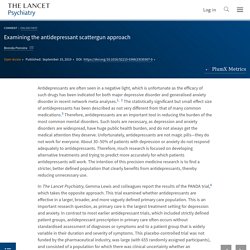
Cipriani A Furukawa TA Salanti G et al. Comparative efficacy and acceptability of 21 antidepressant drugs for the acute treatment of adults with major depressive disorder: a systematic review and network meta-analysis. Lancet. 2018; 391: 1357-1366 Slee A Nazareth I Bondaronek P Liu Y Cheng Z Freemantle N Pharmacological treatments for generalised anxiety disorder: a systematic review and network meta-analysis. Talk Doesn’t Pay, So Psychiatry Turns Instead to Drug Therapy.
DOYLESTOWN, Pa. — Alone with his psychiatrist, the patient confided that his newborn had serious health problems, his distraught wife was screaming at him and he had started drinking again.

With his life and second marriage falling apart, the man said he needed help. But the psychiatrist, Dr. Stimulants for ADHD Shown to Cause Sudden Death in Children. By Dr.
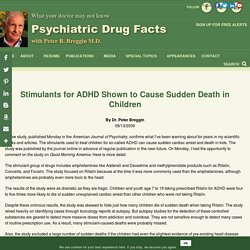
Peter Breggin 09/13/2009 A new study, published Monday in the American Journal of Psychiatry, confirms what I’ve been warning about for years in my scientific books and articles. The stimulants used to treat children for so-called ADHD can cause sudden cardiac arrest and death in kids. The study was published by the journal online in advance of regular publication in the near future. On Monday, I had the opportunity to comment on the study on Good Morning America. Driving Soldiers Crazy with Psychiatric Meds. Dr.
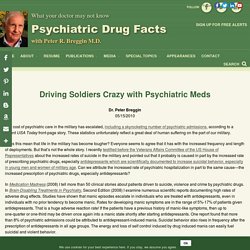
Peter Breggin 05/15/2010 The cost of psychiatric care in the military has escalated, including a skyrocketing number of psychiatric admissions, according to a recent USA Today front-page story. These statistics unfortunately reflect a great deal of human suffering on the part of our military. Does this mean that life in the military has become tougher? Everyone seems to agree that it has with the increased frequency and length of deployments. In Medication Madness (2008) I tell more than 50 clinical stories about patients driven to suicide, violence and crime by psychiatric drugs. And this data is limited to antidepressants alone!
On Saturday May 1, 2010 I gave a two-hour presentation at the 18th Annual International Military & Civilian Stress Conference in Los Angeles directed by Bart Billings, Ph.D. Neuroleptics or antipsychotic drugs. Breggin, PR. (2016).
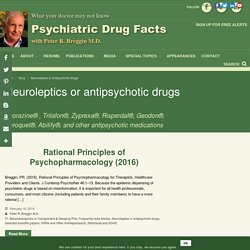
Rational Principles of Psychopharmacology for Therapists, Healthcare Providers and Clients. J Contemp Psychother 46:1–13. Because the epidemic dispensing of psychiatric drugs is based on misinformation, it is important for all health professionals, consumers, and most citizens (including patients and their family members) to have a more rational […] Read More “Parallels between Neuroleptic Effects and Lethargic Encephalitis: The Production of Dyskinesias and Cognitive Disorders,” Brain and Cognition 23 (1993). parallelsbetween.pbreggin.1993.pdf Read More A sample chapter from Dr. Read More. The syndrome of irreversible lithium-effectuated neurotoxicity. - PubMed - NCBI. What Should We Really Call Psychiatric Drugs? There is a single scientific term that most appropriately describes psychiatric drugs.
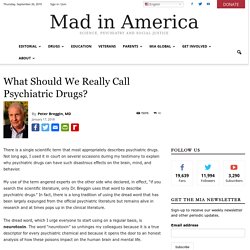
Not long ago, I used it in court on several occasions during my testimony to explain why psychiatric drugs can have such disastrous effects on the brain, mind, and behavior. My use of the term angered experts on the other side who declared, in effect, “if you search the scientific literature, only Dr. Breggin uses that word to describe psychiatric drugs.” In fact, there is a long tradition of using the dread word that has been largely expunged from the official psychiatric literature but remains alive in research and at times pops up in the clinical literature.
The dread word, which I urge everyone to start using on a regular basis, is neurotoxin. What is a Neurotoxin? A toxin is “any substance poisonous to an organism.” There is no rational way to argue against putting psychiatric chemicals into the category of neurotoxins. How Drug Companies Seek to Create Psychiatric Neurotoxins.
Psychiatric Drug Withdrawal. A Guide for Prescribers, Therapists, Patients and their Families By Peter Breggin, M.D.
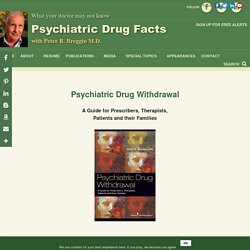
Springer Publishing Co. Nothing in the field of mental health will do more good and reduce more harm than encouraging withdrawal from psychiatric drugs. The time is past when the focus in mental health was on what drugs to take for what disorders. Now we need to focus on how to stop taking psychiatric drugs and to replace them with more person-centered, empathic approaches. My new book, Psychiatric Drug Withdrawal: A Guide for Prescribers, Therapists, Patients and Families, responds to a citizen rebellion that demands, “Help us get off these drugs!” PANDA sertraline ineffective @ all levels of depression: Summary Background Depression is usually managed in primary care, but most antidepressant trials are of patients from secondary care mental health services, with eligibility criteria based on diagnosis and severity of depressive symptoms.
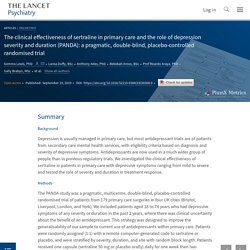
Antidepressants are now used in a much wider group of people than in previous regulatory trials. We investigated the clinical effectiveness of sertraline in patients in primary care with depressive symptoms ranging from mild to severe and tested the role of severity and duration in treatment response. Got Meds? MEDICA. Info Gone Wild. Virology 2019.